The festivals in Ethiopia offer a vivid mosaic of spiritual devotion, cultural pageantry, and timeless traditions passed down through generations. From majestic religious ceremonies and tribal gatherings to musical spectacles and harvest feasts, these popular festivals reflect the country’s rich and diverse heritage. Celebrated across lush highlands, bustling towns, and ancient cities, each event bursts with colour, rhythm, and meaning. They unite communities through sacred rituals, dance, and music, offering visitors an immersive journey into Ethiopian identity. These vibrant celebrations embody centuries of history, resilience, and a deep sense of belonging and pride.
Top 9 Festivals In Ethiopia
Here is a list of the best festivals in Ethiopia that invite you to witness ancient rites, heartfelt rituals, and joyful communal celebrations.
1. Timket (Epiphany)
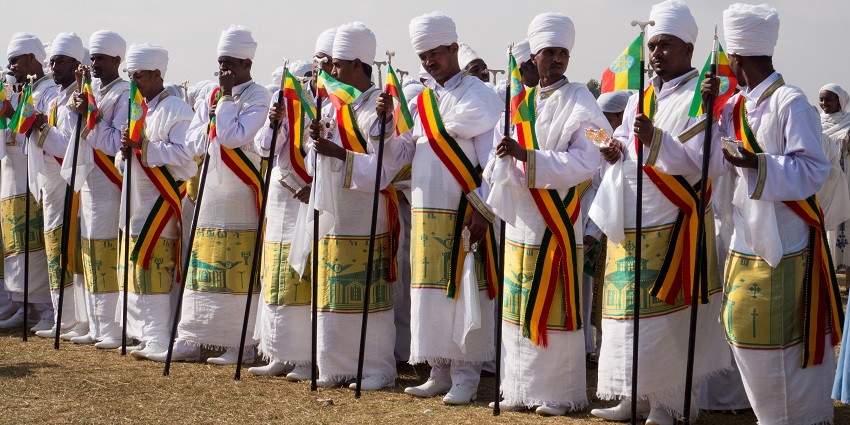
Photo: Jean Rebiffé / Wikimedia Commons
Timket is a breathtaking Orthodox Christian celebration commemorating the baptism of Jesus. Celebrated with mass processions, chanting, and dramatic re-enactments, the highlight is the blessing of water, where devotees gather to be sprinkled with holy water. Priests carry replicas of the Ark of the Covenant, while white-clad crowds sing and dance in spiritual unison. This deeply moving festival is a pinnacle of faith and unity.
Location: Nationwide (notably in Gondar, Addis Ababa, Lalibela)
Month: January
2. Meskel (Finding Of The True Cross)
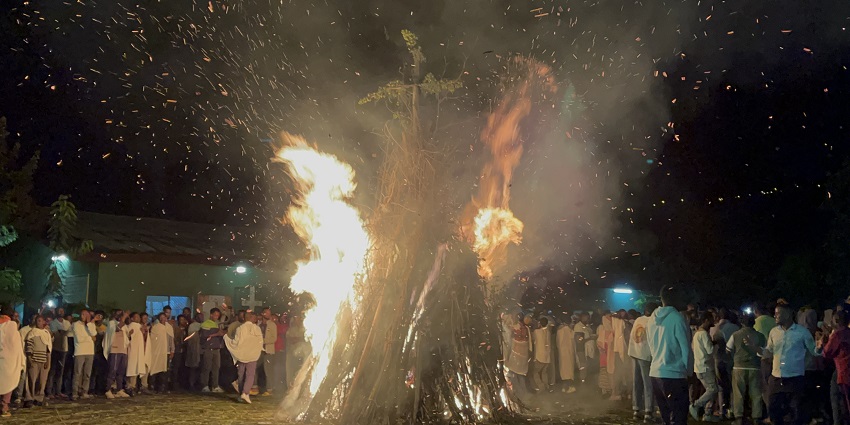
Photo: Mamed077 / Wikimedia Commons
Meskel marks the discovery of the True Cross by Empress Helena. Celebrated for over 1,600 years, the festival is famed for the “Demera”—massive bonfires lit in city squares across the country. Revellers sing, chant, and wave yellow Meskel daisies as flames rise skyward, symbolising light, hope, and the triumph of faith. The capital, Addis Ababa, hosts the grandest celebration in Meskel Square.
Location: Addis Ababa and nationwide
Month: September 27
3. Enkutatash (New Year)
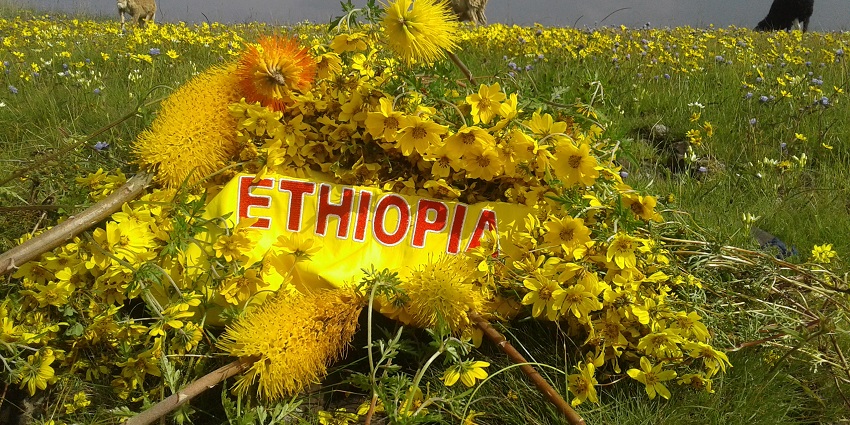
Photo: Tewodros Kassa / Wikimedia Commons
Ethiopia rings in its New Year—Enkutatash—every September with flowers, music, and heartfelt wishes. Rooted in ancient Ethiopian and Christian traditions, the day celebrates renewal and blessings. Children sing door-to-door, gifting hand-drawn cards and wildflowers. In rural areas, it coincides with the end of the rainy season and a vibrant burst of greenery. Much like the colorful music festivals in Ethiopia, Enkutatash is a time for family feasts, joy, and spiritual reflection.
Location: Nationwide
Month: September 11 (or 12 in leap years)
4. Gena (Ethiopian Christmas)
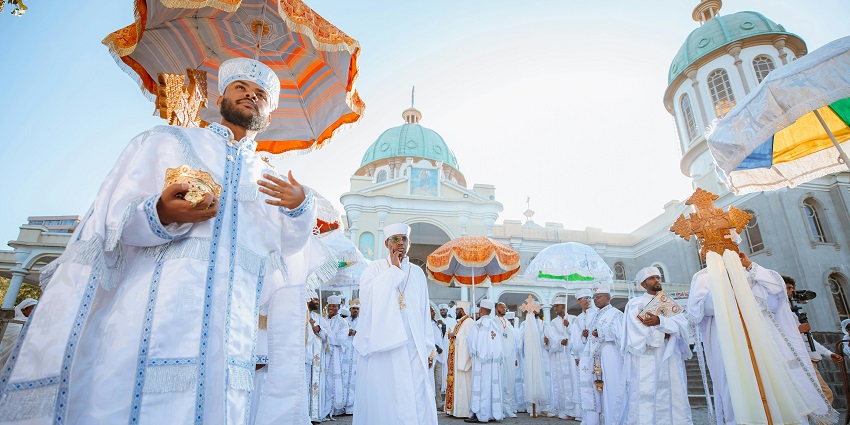
Photo: Gift Habeshaw 🇪🇹 / Pexels / Image For Representation Only
Ethiopian Christmas, or Gena, offers a unique and ancient experience of Christ’s birth. Celebrated with midnight mass, drumming, and traditional hymns, Gena also features the namesake sporting event—an energetic stick-and-ball game similar to field hockey. In cities like Lalibela, thousands gather in candlelit processions and prayer. As one of the best festivals in Ethiopia, it’s a beautiful convergence of spirituality and joyful tradition.
Location: Especially prominent in Lalibela and Addis Ababa
Month: January 7
5. Irreecha (Thanksgiving Festival Of The Oromo)
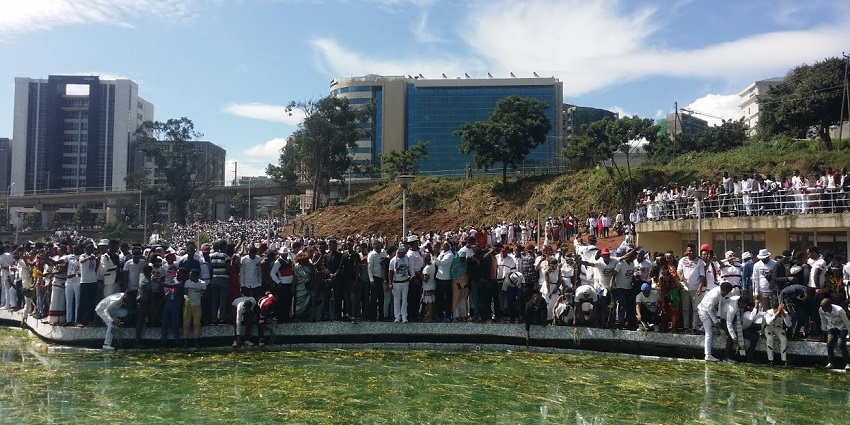
Photo: Mohammed Kassahun / Wikimedia Commons
Irreecha is the Oromo people’s joyous thanksgiving ceremony, expressing gratitude to Waaqa (God) for peace, health, and harvest. Celebrated at riverbanks, lakes, and sacred grounds, participants dress in vibrant traditional attire and carry fresh grass and flowers. Songs, dances, and poetry honour ancestral wisdom and natural harmony. Irreecha unites millions in a peaceful, nature-centric celebration.
Location: Bishoftu and Hora Harsadi Lake
Month: Late September to early October
6. Fasika (Ethiopian Easter)

Photo: Maurice Chédel / Wikimedia Commons
Fasika is a deeply sacred and emotional event in the Ethiopian Orthodox Church calendar, marking Christ’s resurrection. After weeks of fasting from meat and dairy, Ethiopians gather at midnight for mass services, followed by joyous family feasts. Churches glow with candlelight, and chants fill the air, echoing a profound spiritual release. As one of the most revered festivals in the country, Fasika is a moving tribute to devotion and rebirth.
Location: Nationwide
Month: April or May (based on the Julian calendar)
7. Hidar Tsion (Feast of St. Mary of Zion)
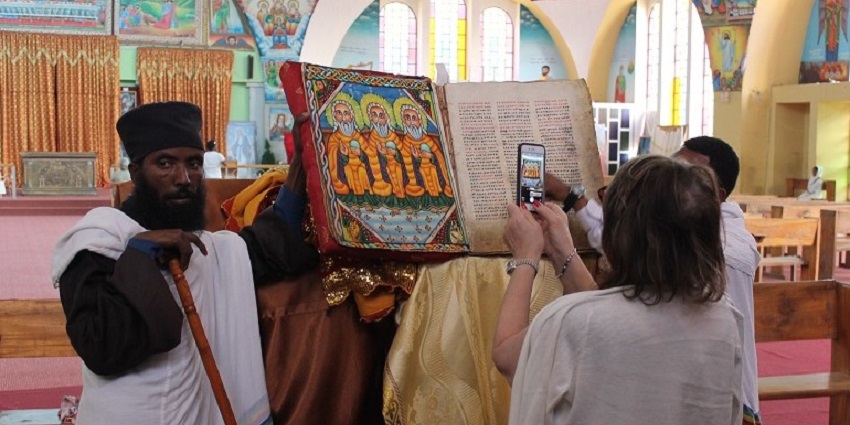
Photo: Charliefleurene / Wikimedia Commons / Image For Representation Onl
This solemn pilgrimage honours the Virgin Mary at her legendary Ethiopian resting place—the Church of St. Mary of Zion in Axum. Tens of thousands of Orthodox Christians gather here in prayer, chanting, and celebration. Pilgrims often travel for days on foot, sleeping outdoors to demonstrate their devotion. The festival culminates in candlelit vigils, colourful processions, and sacred rituals. Deeply rooted in Ethiopia’s national identity and Orthodox faith, it’s a profound spiritual experience and one of the most meaningful things to do in Ethiopia for travelers seeking cultural and religious immersion.
Location: Axum
Month: November 30
8. Buhe
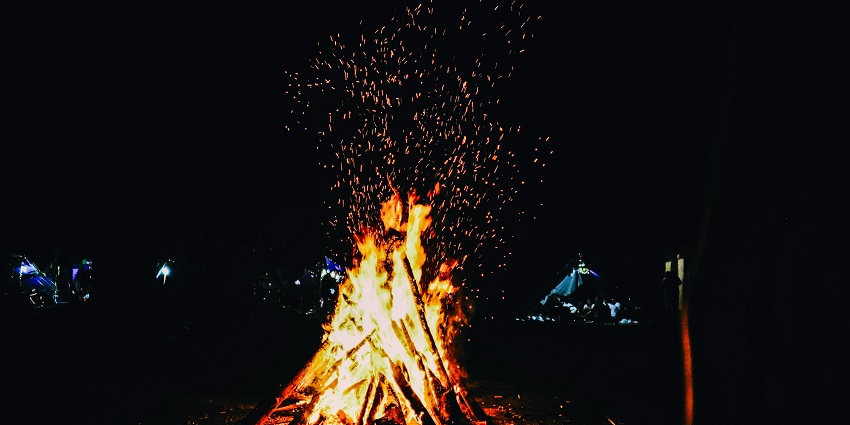
Photo: Min An / Pexels / Image For Representation Only
Buhe is a vibrant festival for boys, celebrated in the rainy month of Nehasé. Groups of young boys go from door to door, singing traditional songs around small bonfires while holding glowing sticks called chibo. In return, they receive fresh bread and small gifts. It’s a lively, community-oriented celebration that reflects Ethiopia’s rich oral traditions and youthful joy.
Location: Rural and urban communities nationwide
Month: August 19
9. Ashenda
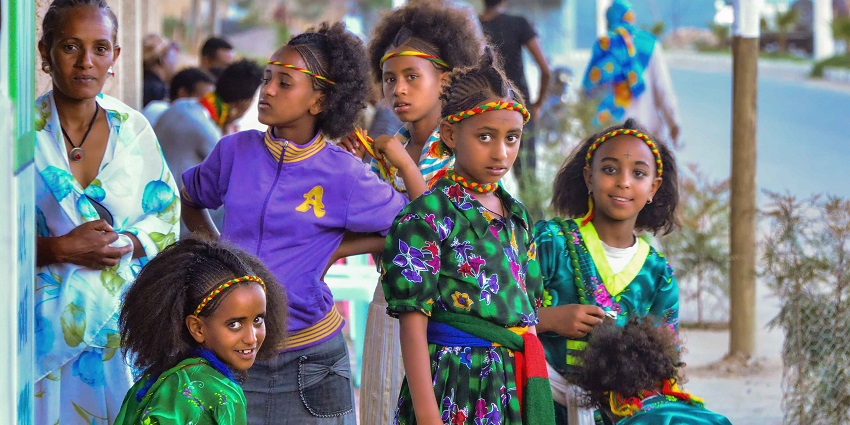
Photo: Rod Waddington / Wikimedia Commons / Image For Representation Only
Ashenda is a northern Ethiopian festival that celebrates women and girls in a radiant explosion of song, dance, and colorful attire. Originating in the Tigray and Amhara regions, it marks the end of the Virgin Mary’s fast. Young women wear traditional dresses adorned with jewelry and sing in groups across villages. Travelers arriving through major airports in Ethiopia often plan their visit around this event, as Ashenda stands as one of the most empowering and famous festivals, celebrating femininity and community.
Location: Tigray, Wollo, and parts of Amhara
Month: Late August (after the Assumption of Mary)
These famous festivals in Ethiopia invite you into a world where ancient faith, joyful community, and vibrant traditions converge. Whether you’re walking in sacred processions, dancing in the highlands, or joining riverside gatherings, each event offers a vivid window into Ethiopia’s soul. From the candlelit rituals of Timket to the jubilant songs of Ashenda, the festival calendar reveals a country rich in spirit and celebration. Plan a trip with TripXL today.
Cover Photo: Christian Alemu / Pexels / Image For Representation Only


 WhatsApp
WhatsApp
 Twitter
Twitter









